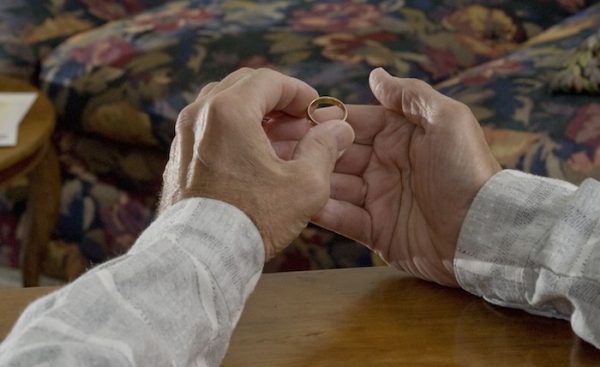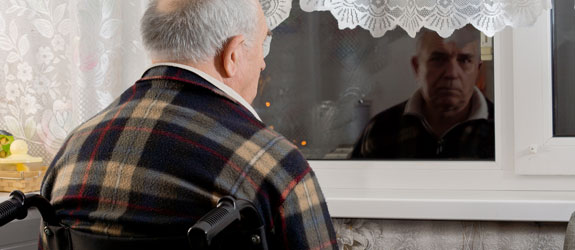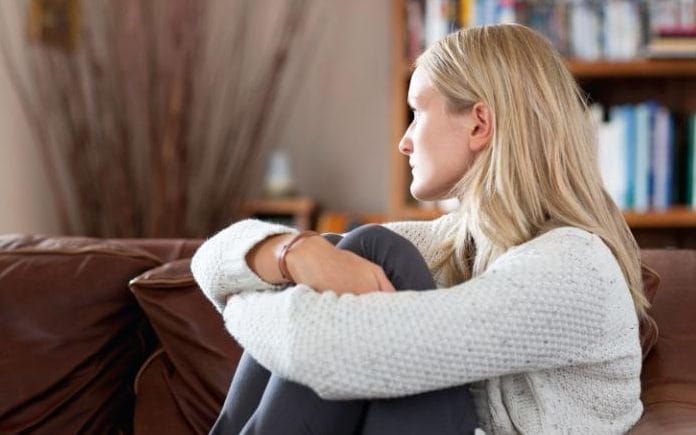
By Michael Lewis
[V]elta Lewis died the morning of May 15th in the arms of her husband in the home they had purchased upon retiring three years previously. Her death, nine months after the diagnosis of lung cancer, occurred shortly before the couple expected to celebrate their 52nd wedding anniversary during a two-week trip to Paris. My father was devastated. Over the following weeks, I would find him sitting alone in their darkened family room – no television, no radio, no conversation to break the silence – staring with red-rimmed eyes into the past, trails of tears upon his cheeks.
If you have experienced the death of a loved one, you understand how grief can stun, even take you to your knees. In the midst of your own pain, it is easy to forget others who suffer. However, in the case of a parent whose spouse has died, it is at this time that your strength and compassion is most needed.
Dealing With the Death of a Spouse
Members of the Greatest Generation were no strangers to death. My dad had experienced the passing of his grandmother as a young boy, and witnessed her body resting in the parlor of their house for final viewing, as was the custom in those days. He had spent almost a year in Europe during World War II, losing buddies to the ravages of battle. In the ensuing years, he and my mother buried parents, relatives, and friends, the funerals becoming more frequent as they grew older. They were religious people, neither fearing death, sure of their place in eternity.
But generally, the natural order of life is for husbands to go first, not wives. They had worked and saved over the years, expecting to enjoy 5 to 10 years of travel and seeing grandchildren before Dad’s time to go. Mother dying first was unnatural in the grand scheme of things – unlikely, but not impossible. In fact, according to the U.S. Census figures in 2012, husbands are 3.2 times more likely to die before their wives, with 36.9% of women older than 65 widowed compared to 11.5% of men over age 65 who are widowers. To my father, all of their shared preparations for their final days were suddenly pointless.
Even when husbands die first, the toll on the surviving wife can be equally overwhelming, particularly if the death is unexpected. The survivor loses not only a mate, but a long-term partner, an everyday companion, and, commonly, a caregiver. Grief and sorrow as well as guilt for being a survivor are common feelings and take time to reconcile. Many survivors report a deep sense of loneliness and isolation that can take months, even years to overcome; the closer the marital relationship, the more depressed the surviving partner is likely to be.
Their grief can sometimes have fatal consequences if untreated. A 2013 study by the Harvard School of Public Health found that a surviving spouse over the age of 50 has a 66% increased risk of dying within the first three months of the spouse’s death. Physicians often refer to the “broken heart syndrome,” or stress cardiomyopathy, the result of a sudden stress like the unexpected death of a loved one.
If the couple is ill or frail, the consequences of the death of one of the partners is particularly distressing for the survivor. Together, they can live independently by relying on each other. When one dies, the other may not be capable of living alone, and must cope with the loss of their spouse and, possibly, their independence.
Ironically, surviving spouses who are better off economically are likely to be more depressed. According to Rutgers Professor and sociologist Deborah Carr, “Those who own a home may do worse because they have the added strain of caring for a house. They may be more socially isolated, lonely, and even afraid of living in a home alone, compared to surviving spouses who live in apartments and have neighbors close by.”
Since many elderly couples divide the tasks of everyday living – for instance, one may cook meals and mow the lawn, while the other pays bills and handles home repairs – the loss of one of the partners may leave the other unequipped or unable to add the new tasks necessary for everyday existence. For instance, Jackie Buttimer of Bethesda, Maryland had never balanced a checkbook and rarely used a computer before her husband of nearly 50 years died in April 2010. “It’s a huge learning curve, and I had never lived alone,” says Buttimer.
The Role of Children and Friends
Losing a partner affects older adults in multiple ways: Some may continue to function without appearing to be excessively affected, while others are incapable of completing the smallest task. At the same time, you will be grieving for the loss of a mother or father and perhaps recognizing your own mortality. It is important to handle your own grief and fears, but remember that losing a mate is not the same as losing a parent. If possible, your priority should be to comfort your parent first, recognizing that, at times, you may need to withdraw to grieve and recharge.
Do not be reluctant to ask for help from other family members or friends. Many people are willing to help, but hesitate to intrude during this very emotional time. They need your guidance to help in ways that are beneficial, whether it is providing meals, performing needed household duties such as washing clothes or mowing the lawn, or spending time with your parent in conversation and consolation.
There is no definite mourning period or average time to return to “normal.” People do not easily get over their pain; they eventually learn to cope with it as time softens the loss. Some parents may want to talk about the deceased, while others avoid the subject, especially if the death was painful or unexpected. Take your cues from your parent.
Shortly after my mother’s death, my father and I took a week-long automobile trip to visit the locations of his childhood, the hours in the car filled with his recollection of the memories of their life together. We laughed, we cried, and we both felt better. Remember that grief will usually resurface in the years ahead at holidays, birthdays, anniversaries, and any special family days. If and when emotions resurface, it is important to acknowledge and share the feelings.

The Immediate Aftermath of Death
Even with well-planned, predetermined arrangements, there are a number of responsibilities that require attention following a death. The surviving mate may be overcome with grief so these duties must be completed by a child or another representative of the family. They include:
- Notification of the Proper Authorities. If the death occurs at home, as in my mother’s case, a hospice representative and a physician are required to pronounce death and dispose of any restricted pharmaceutical drugs remaining unused. If the death was unexpected, a coroner or medical examiner may be required at the scene. The medical personnel typically make arrangements to transfer the deceased to the mortuary of choice.
- Making or Reviewing Funeral Arrangements. In many cases, arrangements have been made concerning the disposition of the body (burial or cremation), burial sites, and funeral services. The arrangements need review, and occasionally change to accommodate the last wishes of the deceased or surviving spouse. This is a particularly emotional time which some unscrupulous funeral directors may attempt to exploit by up-selling to more expensive caskets, extensive flower arrangements, or elaborate tombstones. The best counsel is to follow the wishes of the deceased as close as possible, assuming the arrangements were made under less emotional circumstances.
- Contacting Family, Friends, and Clergy. Family members, often spread across the continent, need to be contacted and informed of funeral arrangements, with time between the death and service for those to travel if necessary. Close friends should be contacted personally with the request that they contact others who might wish to pay their respects. Churches often respond immediately when noticed of a member’s death with offers of meals and other help.
- Notifying Legal, Financial, and Government Authorities. While these duties can be delayed until after the funeral and receipt of death certificates, the Social Security Administration should be notified so that monthly benefits can cease and survivor’s benefits can be initiated, if available. Life insurance claims should be filed. Institutions which provide jointly-owned bank accounts, credit cards, or other property need to be notified and provided with proper documentation to transfer ownership as dictated by the will of the deceased. If an attorney has not been previously involved in estate planning, seeking counsel to proceed most efficiently to probate any will and settle the estate may be wise.
- Delaying Payment of Medical Bills for the Deceased. In the weeks following my mother’s death, my dad was deluged with medical bills relating to my mother’s care and death, even though the costs had been incurred in her name and covered by Medicare. Information systems in the medical industry are notably inefficient, outdated, and inaccurate. As a consequence, many providers continue to bill my deceased mother, even though accounts had been previously paid or were not legally due. My father, wishing to honor my mother’s good name, would pay the accounts, being unable to determine whether the balance was legitimate or not. In the event of a death, it is wise to delay any medical payments for the deceased for a minimum of three months so that billings and collections can be properly recorded and amounts owed properly reconciled.
Depending upon the planning preceding the death, the ability of the survivor to handle legal and financial matters, and the complexity of the estate, there will almost certainly be additional cases where the help or guidance of a child to protect the interests of the surviving parent will be necessary.
Signs of Continuing Grief in the Elderly
Many people appear to quickly bounce back after a tragic event, but appearances can be deceiving. According to the American Hospice Foundation, some signs that your parent is still grieving include the following:
- Forgetfulness. Missing appointments, locking keys in the car, or mailing unsigned checks with bills are all signs that your surviving parent may have difficulty focusing. Be patient and suggest written reminders to stay focused.
- Disorganization. Taking longer or failing to complete one task before beginning another is often seen in grieving adults. Written schedules can help.
- Inability to Concentrate. Grief causes the mind to wander, so reading a book or watching a television show can be difficult. Be especially alert if your parent continues to drive an automobile or operate dangerous machinery.
- Lack of Interest or Motivation. Your parent may question the purpose of life or why any effort is worth doing. Listen to them, express love and support, and keep trying to get them involved in something beyond their immediate environment.
- Fascination With Death or the Hereafter. While it’s natural to think about it following a death, a fixation on death combined with depression can lead to suicide. Involve a therapist immediately.

Specific Problems That May Arise
While most people gradually recover from the death of a long-term spouse, there are unique problems and circumstances that can complicate or extend the healing process. As their child, you should be cognizant of the potential areas which can cause obstacles and seek to minimize them.
1. Loss of Independence
The death of a spouse emphasizes the physical fragility of the survivor. As people grow older, muscle strength declines, and problems with balance and gait appear. Neurological conditions such as Parkinson’s, high blood pressure, neuropathy, and vision problems such as glaucoma and cataracts can cause unsteadiness and falls, and may require certain medications. A pair of people living together can look after one another and call for help when necessary – but a person living alone lacks that security.
If your elderly parent wants to live alone but may be subject to falls, consider improving the physical environment of the home by removing loose rugs, installing railings on stairs, adding ramps, and putting grab bars in the bathrooms. Adding a home monitoring system may give you and your elderly parent peace of mind.
2. New Tasks to Learn
During the 50-plus years he was married, my father rarely wrote a check, paid a bill, or determined which investments were made in the family’s retirement accounts. In other families, the wife may have let her husband take care of all financial matters. Some surviving partners do not know how to cook or to drive a car.
When a spouse dies, the survivor is required to assume new responsibilities, which can be overwhelming. Fortunately, technology has become increasingly simple, so that even the most unfamiliar can learn basic tasks necessary to everyday life. Encourage your parent to sign up for community courses for the elderly in local colleges, universities, local chapters of the American Association for Retired Persons (AARP), or senior centers. They may find friends with common interests and learn new skills that will allow them to connect with a broader world.
3. Financial Complications
Problems with the level or management of assets can arise after the death of a spouse. For example, a husband and wife typically draw two Social Security checks each month. With the death of one spouse, income is reduced. Annuity or retirement plan distributions may also be changed. In many cases, the deceased spouse may have been responsible for making day-to-day management decisions in the family retirement portfolio, expertise that is no longer available with the passing of the partner.
Depending upon the will and wishes of the dying spouse, control of the assets may rest solely with the survivor, potentially complicating efforts to protect their financial interests. Unfortunately, surviving elderly spouses are popular targets for con-men, crooks, and unscrupulous investment salesmen. If you have suspicions that your parent is unable to rationally make investment decisions or under the influence of those who do not have his or her best interests in mind, seek legal help immediately.
4. Loneliness and Depression
Intermittent periods of depression and loneliness invariably accompany the death of spouse. In fact, healthy grieving is a process that can last for months or years. However, as time goes by, the periods of loneliness and depressions usually become shorter while the periods between depressions extend. In some cases, however, months can go by without any sign of improvement. Mental professionals call this condition “complicated grieving.”
Signs of complicated grief include the following:
- An inability to accept that death has occurred
- Frequent nightmares and intrusive memories
- Withdrawal from social contact
- Constant yearning for the deceased
Grief has physical consequences – loss of appetite, trouble sleeping, headache, fatigue, muscle tension – which generally result in decreased exercise, deficient diet, and an over-reliance on medication. If your parent seems to be stuck in a continuing cycle of depression, seek psychological help and encourage them to talk to friends or a spiritual advisor.

Remember to Take Care of Yourself
Trying to help your parent recover from death-related grief is akin to rescuing someone from drowning. You may be struggling with your own depression and feelings of guilt and regret. If you find that you cannot help your father or mother without sacrificing yourself in the process, ask for help from other family members, a friend, or a mental health professional.
Take time for yourself and your immediate family and seek a support group if necessary. Be sure you maintain a good diet, keep exercising, and get plenty of sleep. And focus on the good memories of the parent who is gone as well as the one who survives. Remember that time will eventually lessen your pain.
Final Word
My father eventually followed my mother in death. He was unafraid, even excited, since he believed that his wife was waiting on the other side, and the two would spend the rest of eternity together.
While helping my dad through his grief at my mother’s passing was at times inconvenient and frustrating, I have no doubt that our relationship deepened and strengthened as a result. If the occasion arises where you are called to help one of your parents after the death of your other parent, welcome the opportunity to share your grief and express your love. Like births, death can show us the joy of life and family.
What other tips can you suggest to help a parent deal with the death of a spouse?
Complete Article HERE!











